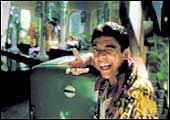|
|
 |
|
|
 |
|
Advertising is business: It's rhyme and reason,
and if you're still not very convinced, try the third R—read
|
|
BACK
OF THE BOOK
|
What
would you do if you started your career selling Ariel, fought on
both sides of the cola war, woke up with the image of the 'Ayacola'
and then got slammed by peers and analysts for the world's biggest
marketing goof-up?
Why, claim guruhood. How? Ask Sergio Zyman,
the discredited one-time marketing chief of the world's biggest
brand, Coca-Cola. To his credit, he doesn't go zombie-raking or
victimhood-spinning. A marketing man, he knows the value of universal
objectivity all too well.
So what does his book say? That advertising
ain't just some 30-seconder; the fact is that "everything communicates".
It ain't an expense; but "an investment". And, above all,
advertising ain't no art; it's a job, and the job is to-brace yourself-
"sell stuff".
|
|
|
The End Of Advertising As We Know It
By Sergio Zyman With Armin Brott
John Wiley & Sons
PP: 239
Price: 1389.12
|
|
|
Purple Cow
By Seth Godin
Portfolio,
Penguin India
PP: 145
Price: Rs 672.75 |
Phew...
who'd have guessed? And what's all this apocalyptic stuff doing
in the title-or is 'know' to be taken in some pre-modern sense?
"Either change your ways," intones
Zyman darkly, "or find another line of work." Off-the-wall
ads are history (even if the wall isn't). Clients have wisened up
(even if adfolk haven't). Yep. And if you the reader want your money
back, that's terrific, he says, since you're thinking ROI here,
and that's the point. While at it, the book's purpose, he adds,
is to provide "yoga for the brain".
Otherwise, much of the book runs like some
Jerry Seinfeld sitcom, with his trademark irreverence working overtime
to out-fuss Apple's 'Think Different', out-stamp Absolut's image
in "everything you know" and outrage The Coca-Cola Company
with "yeah right", "okay it's the real thing, now
pass the Pepsi" and the like.
Rather rich, you'd think, coming from someone
who got adfolk gnashing their teeth (and calling him the 'Ayacola')
by telling them to "stop entertaining people". All the
more so from someone who saw a survey-detected preference for sweeter
cola as a sign of reality, and merrily launched New Coke, which
lasted all of 77 days before consumer convulsions forced Classic
Coca-Cola back (no, in Zyman's narration, it was not a ploy to stir
emotion).
Doesn't any of it haunt him? Are you kidding?
Zyman has only a shrug to offer in response to his fun-pooping fumble-man
image. And an incorrigible fun-pooper he still is, in appealing
straight to the ring of the cashbox. Stark cut-to-the-deal talk
works, and Zyman knows it. "Sell stuff." Clever.
Oh, one other thing. Somewhere, Zyman also
knows the big flaw in his quasi-literalist position. In the ultimate
analysis, to define is to confine. And the brand-customer relationship
is a strict functionally-defined deal no more than a human marriage
is a man-made 'sex contract'. It is, rather, a sophisticated ever-evolving
affair. The kind that's sustained by mutual stimulation, artistic
refreshment, imaginative empathy and mind-grabbing differentiation.
A fizzy bathtub is funny, a fuzzy 'filaver pot' funnier.
They entertain-and sell stuff too. Besides,
don't forget the late Roberto Goizueta, a man who knew a thing or
two about making money. "Be different," he said, "or
be damned." Which is also the Bernbach-esque message of this
other book by Seth Godin (of 'ideavirus' fame). "You're either
remarkable or invisible," he says, "Make your choice."
From a French baker's special bread to an engineering firm's smart
lifts, Godin picks out a series of unforgettables, flaws n all.
And then poses his big question: "What would happen if you
told the truth?" Would the end still be nigh?
|
|
|
Beyond Disruption
By Jean-Marie Dru
John Wiley & Sons
PP: 304
Price: 1,488.52
|
Why
does absolut Vodka command a 20 per cent premium over other vodka
brands? The answer is rooted in 'disruptive advertising' that positioned
the drink as a fashion brand rather than a conventional spirits
brand. Jean-Marie Dru, President and CEO of TBWA, who introduced
the world to 'Disruption' by authoring a book of this title in 1996,
now takes us through disruption in action through this sequel.
The essence of disruption is questioning conventional
wisdom. Are consumers always right? Do they know what they want?
How far should companies let them dictate decisions? "If I
had asked the public how they wanted their coffee, I doubt they
would have requested a double-short caramel skim cappuccino"
and been willing to pay a premium for it. Companies have to do things
the consumer would never think of. The disruptive idea here is that
it is not the consumer who is the hero, but the idea.
Disruption is part of the creative process
that an organisation's culture can imbibe through the use of tools
painstakingly detailed in the book, like "The What If Process"
or identifying the possibly false assumptions that constrain the
brand's performance through the "conventions planets"
tool.
The message: identify conventions, bust them
and cause a disruption to create a new market or capture a larger
share of an existing market. That is the success secret of brands
like Apple, Tag Heuer and Sony Playstation.
While "Disruption or Bust" is the
message that Dru and his co-authoring business partners seek to
convey, they fail to warn prospective practitioners about the possibility
of Disruption "and" bust. There are no examples of failed
disruption cases that would have given a more balanced picture of
brave companies and agencies that embrace disruption. Nevertheless,
it is a good how-to on convention busting.
-Vandana Gombar
 War
And The Media Reporting Conflict 24/7 War
And The Media Reporting Conflict 24/7
Ed. By Daya Kishan Thussu And Des Freeman
Vistaar Publications
Price: Rs 340
PP: 266
Academic essays on the so-called "first casualty of war" and all
the associated spin that allegedly gets deployed by the media in
the pursuit of top-defined objectives.
 Transnational
Television,Cultural Identity And Change Transnational
Television,Cultural Identity And Change
By Melissa Butcher
Sage Publications
Price: Rs 370
PP: 322
A field researcher from the University of Sydney on what the satellite
TV invasion, as exemplified by Rupert Murdoch's Star TV, has done
to India.
|
